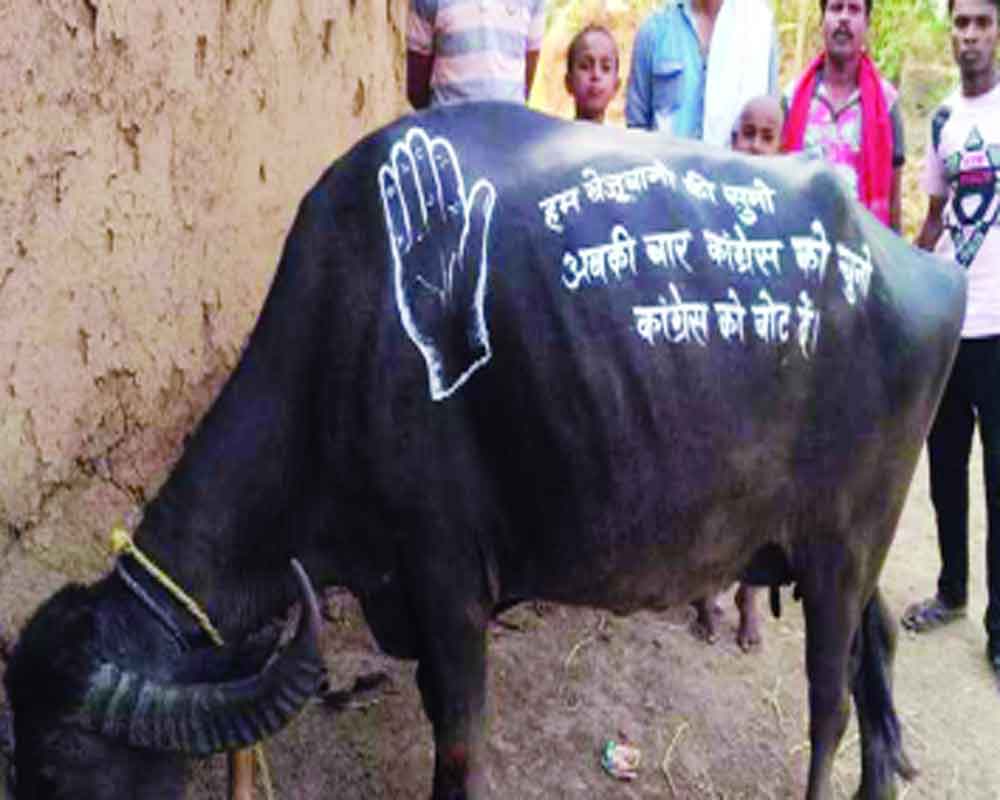The EC’s ban on the use of animals for electoral purposes is welcome. In doing so, it has not only recognised the fact that animals cannot be used as inanimate props but also questioned our perception of them as sentient beings
With the Election Commission (EC) of India announcing dates for the general election, the Model Code of Conduct (MCC) — the document to ensure fair conduct among political parties in the run-up to the 17th Lok Sabha elections — came into force. While I expect the usual circus of parties — complaining against one another and numerous reprimands by the EC — I am relieved that animals will be spared in this drama.
Chapter 22 of the MCC notes: “The Election Commission has advised the political parties and candidates to refrain from using any animal for election campaign in any manner. Even a party, having a reserved symbol depicting an animal, should not make live demonstration of that animal in any election campaign of the party/any of its candidate.”
The EC’s move is laudable and indicates its recognition of the abuse animals are subject to when used for exhibition or performance. Use of animals during road shows, rallies or for campaigning is a pointless activity where they are tortured, beaten and neglected while the netas hog the limelight, usually after arriving many hours late. There are many instances of animals being abused during public events, which turned violent.
Political parties, which have animal symbols as part of their emblem, are known to bring animals to their rallies to showcase their strength and celebrity-like status. Not only does this glorify the vanity of the party but also comes to show that such tactics are used to pull large crowds and gather support in the absence of organic support or loyalty to the party. These animals, mostly elephants and horses, are subjected to throngs of unruly humans and end up being used as props for politics.
Often, they are made to carry heavy loads throughout the day, without any consideration of food, water or rest. No veterinarians are available on the site of the rally, meaning the well-being of the animals is no one’s priority. Consistent with the history of animal abuse in travelling circuses, mandatory permissions are never taken for the use of animals. Even in cases where permissions are granted, the Animal Welfare Board of India (AWBI) — the statutory body to ensure the well-being of animals in the country — does not have enough manpower to ensure the animals are not needlessly harassed.
Although the AWBI was set up with the purpose of implementing the statutory rules under the Animal Welfare Division, the body only plays an advisory role. As the national federation for animal rights, FIAPO has often worked with the AWBI to ensure Government-sanctioned inspections take place as part of our legal battle to end the use of animals in circuses.
With the support of the AWBI, the liberation day for animals in circuses is not too far away. This, the ban of animals in circuses, will be a historic day for animal rights movement in India — for the recognition of animals as sentient beings. Not only will the citizens of India acknowledge the inhuman treatment meted out to animals in circuses but also see the reality behind each industry and business that profits off of animals.
For activists and organisations working for the protection of animals, such precedents are of immense importance. The EC’s move is a similar show of empathy and kindness to animals. And we may even be in a position to say that the greatness of our nation and its moral progression can be judged by the way we treat our animals.
We are the nation that gave the world ahimsa; we are the country of a million gods, many of whom are personified animals. We risk the danger of being branded cultural, religious and legal hypocrites if we let such callous and outright cruel treatment to animals to continue. This is already happening in Kerala where tourists are boycotting public events with elephants as they are treated inhumanly to make them perform.
I welcome the EC’s move also because it recognises that animals cannot be used as inanimate props. Though the primary intention of the advisory is to avoid inconvenience to the public, I think it also questions our perception of animals. They are thinking, feeling beings who deserve to be treated with respect. To expect animals to pose in a rally, just as they are depicted on party pamphlets, is indicative of our indifference to their natural identity. It is time we evolve from such outdated attitudes and give animals basic recognition as sentient beings.
The world’s largest democracy not only gives its citizens rights but its animals the right to live a life free of abuse and with dignity. During this election’s circus, I will be happy not because no animal is blocking my way to work but because the animals have been spared abuse despite being the electoral symbols of political parties.
(The writer is Executive Director, Federation of Indian Animal Protection Organisations)


























